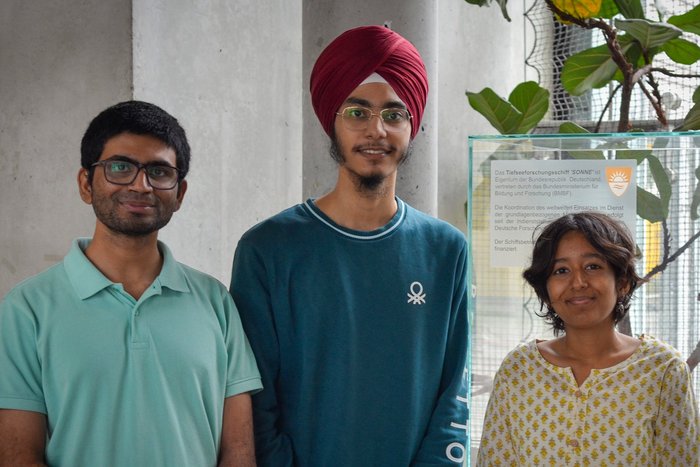Observations, theory, and machine learning: Three guests from the IISER-MPG program start their work
Thanks to the cooperation program between the Max Planck Society (MPG) and the Indian Institutes of Science Education and Research (IISERs), which was launched in 2023, the Max Planck Institute for Meteorology (MPI-M) has been able to bring in several young talents to work on challenging projects over the past two years. This year, the institute is once again welcoming three master's students from India: Srinivas Adireddi, Medha Murti, and Chitvan Singh who have been visiting the MPI-M since June.
Chitvan Singh: Trade cumulus clouds
Chitvan Singh, a student at IISER Pune in western India, recounts how he and his fellow students had been eagerly awaiting the results of the selection procedure. “I was really happy when I found out that I could come to Hamburg,” he said. He will now be conducting research in Julia Windmiller's “Tropical Cloud Observations” group until March 2026. MPI-M researchers Theresa Mieslinger, Bjorn Stevens, and Geet George, who is now an assistant professor at Delft University of Technology, will supervise his work. “I will analyze observational data from the EUREC4A measurement campaign to determine which processes are responsible for the variability of cumulus clouds in the trade wind zone,” Singh explains. “As a second step, I will apply these findings to satellite data.”
Medha Murti: Ocean heat transport
His fellow student at IISER Pune, Medha Murti, was successful with her application as well: She is working with Noel Brizuela in the “Theoretical Ocean Dynamics” working group on a project investigating how cyclones and other surface winds influence heat transport in the ocean. “I really wanted to work on this specific project,” the student said enthusiastically. Now she is already in the middle of it: “I have plenty of time and space here for a deep dive into theory.” The goal is to build a model of the relevant ocean processes and test it using observations. She will be at the institute until the end of February 2026.
Srinivas Adireddi: Cloud microphysics
Srinivas Adireddi from IISER Kolkata (East India) is conducting research on cloud microphysics in Hauke Schmidt's "Global Circulation and Climate" research group, co-supervised by Pierre-Olivier Downey. Adireddi will utilize machine learning algorithms to analyze how well the distribution of water species, such as the cloud water-to-ice ratio, can be predicted based purely on a model's state variables such as temperature and humidity. This research could allow to improve the representation of the Intertropical Convergence Zone (ITCZ) in high-resolution models like ICON. "I'm currently reading up on the subject and familiarizing myself with the ICON data", Adireddi says. He has until April 2026 to complete his project.
First time in Hamburg
All three IISER guests are visiting Hamburg for the first time. “The city is like a painting—I love how traditional and modern architecture stand side by side, and that there is water all around,” says Srinivas Adireddi. Chitvan Singh adds that he immediately noticed the Hanseatic city's cycling culture. “I want to be a part of it,” he says, which is why he plans to buy a bicycle for himself as soon as possible.
Further information
The IISER-MPG program enables six- to nine-month research stays for excellent master's students from India. The seven IISERs are prestigious public universities primarily in the field of natural and life sciences.
Contact
Srinivas Adireddi
srinivas.adireddi@mpimet.mpg.de
Medha Murti
medha.murti@mpimet.mpg.de
Chitvan Singh
chitvan.singh@mpimet.mpg.de
Dr. Ulrike Kirchner
Research Coordination and Communication
ulrike.kirchner@mpimet.mpg.de

